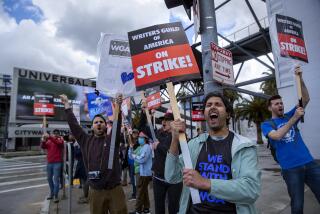If productions are stilled, stars’ trailers will be empty
During the 1988 writers strike, Star Waggons let go of 70 employees. “We had to lay off almost all of our workforce,” said Jason, who along with his brother, Beau, runs the business founded in 1979 by his father, Lyle Waggoner, the now-retired TV actor. “Our business is recession-proof because entertainment always does well, but it’s definitely not strike-proof.”
Best known as the tall, handsome announcer on “The Carol Burnett Show,” Lyle, pictured above, dreamed up the idea for Star Waggons while he was playing the leading man on the 1970s series “Wonder Woman.”
“I know how insecure that business is, so I was looking for something more secure,” said Waggoner, who provided a one-stop shop for trailers to house cast, wardrobe, make-up and production offices on sets. Before Star Waggons, film companies rented motor homes from various places.
He and his sons hope not to lay off any of the 75 people who work at the company’s two manufacturing plants in Sylmar. “We’re always concerned with a strike on the horizon,” Lyle said. “There’s no question we’ll be impacted. But we’re big enough to stay in business and keep manufacturing and refurbishing our fleet.”
Jason said a strike would be particularly harmful in the face of Hollywood’s problem with runaway production. “The reality is that we’re facing so much competition from other states and countries. You’re seeing a ton of business moving out to places like Australia, New Zealand, Spain, Morocco, China, India, Prague, Romania -- it’s not something to be messed with.”
--
Claudia Eller
More to Read
Inside the business of entertainment
The Wide Shot brings you news, analysis and insights on everything from streaming wars to production — and what it all means for the future.
You may occasionally receive promotional content from the Los Angeles Times.










